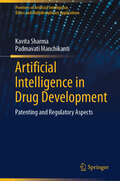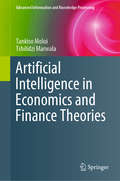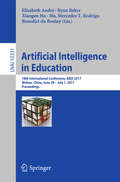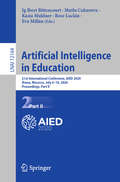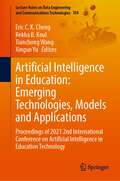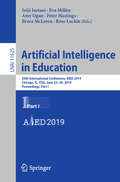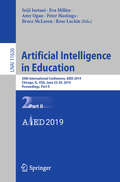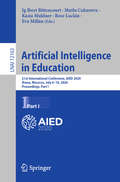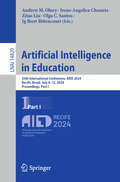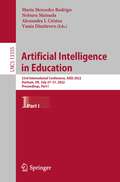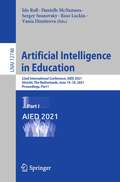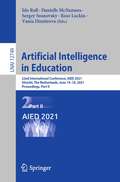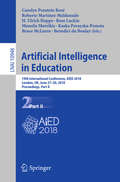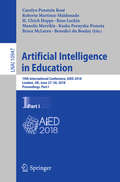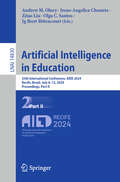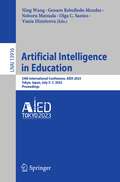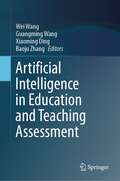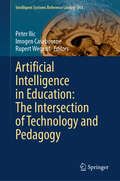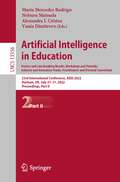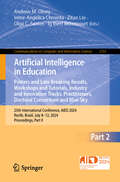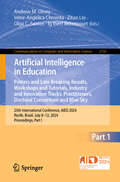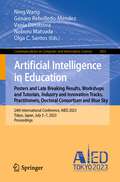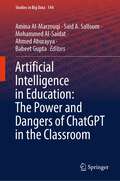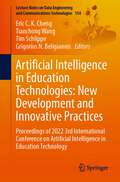- Table View
- List View
Artificial Intelligence in Drug Development: Patenting and Regulatory Aspects (Frontiers of Artificial Intelligence, Ethics and Multidisciplinary Applications)
by Kavita Sharma Padmavati ManchikantiThis book discusses how Artificial Intelligence developments have revolutionized the area of medicine and how companies use them to develop applications. While the book covers the growth of AI in medicine and the early developments in AI based medical tools, it provides an in-depth analysis of the current developments in relation to the area of medical diagnostics. The book focuses on how enterprises and institutes have developed their intellectual property portfolio, particularly patents, in this area. Cross-country patenting analysis helps in understanding key areas of growth in certain markets and also company strategies and arrangements. The introduction of AI based products in market is subject to regulation. The developments in policy and regulation influence the development and deployment of such products into the market. This book brings focus to the development of policy and regulation and how regulatory developments impact the introduction of AI-based healthcare products from a cross-country perspective. Further, how regulatory developments lead to the evolution of standards, build reliability and safety in this area are also examined. The unique aspect of this book is the comprehensive coverage of the dual aspects of the nature and scope of AI-based innovations in health care and the related drug regulatory aspects which are imperative for the understanding for students, researchers, and those who work in this area.
Artificial Intelligence in Economics and Finance Theories (Advanced Information and Knowledge Processing)
by Tankiso Moloi Tshilidzi MarwalaAs Artificial Intelligence (AI) seizes all aspects of human life, there is a fundamental shift in the way in which humans are thinking of and doing things. Ordinarily, humans have relied on economics and finance theories to make sense of, and predict concepts such as comparative advantage, long run economic growth, lack or distortion of information and failures, role of labour as a factor of production and the decision making process for the purpose of allocating resources among other theories. Of interest though is that literature has not attempted to utilize these advances in technology in order to modernize economic and finance theories that are fundamental in the decision making process for the purpose of allocating scarce resources among other things. With the simulated intelligence in machines, which allows machines to act like humans and to some extent even anticipate events better than humans, thanks to their ability to handle massive data sets, this book will use artificial intelligence to explain what these economic and finance theories mean in the context of the agent wanting to make a decision. The main feature of finance and economic theories is that they try to eliminate the effects of uncertainties by attempting to bring the future to the present. The fundamentals of this statement is deeply rooted in risk and risk management. In behavioural sciences, economics as a discipline has always provided a well-established foundation for understanding uncertainties and what this means for decision making. Finance and economics have done this through different models which attempt to predict the future. On its part, risk management attempts to hedge or mitigate these uncertainties in order for “the planner” to reach the favourable outcome. This book focuses on how AI is to redefine certain important economic and financial theories that are specifically used for the purpose of eliminating uncertainties so as to allow agents to make informed decisions. In effect, certain aspects of finance and economic theories cannot be understood in their entirety without the incorporation of AI.
Artificial Intelligence in Education: 18th International Conference, AIED 2017, Wuhan, China, June 28 – July 1, 2017, Proceedings (Lecture Notes in Computer Science #10331)
by Elisabeth André Ryan Baker Xiangen Hu Ma. Mercedes T. Rodrigo Benedict Du BoulayThe theme of this book is Knowledge and Media in Learning Systems, and papers that explore the emerging roles of intelligent multimedia and distributed technologies as well as computer supported collaboration within that theme are included. The spread of topics is very wide encompassing both well- established areas such as student modelling as well as more novel topics such as distributed intelligent tutoring on the World Wide Web. Far from undermining the need to understand how learning and teaching interact, the newer media continue to emphasise the interdependence of these two processes. Collaboration and tools for collaboration are the major topics of interest. Understanding how human learners collaborate, how peer tutoring works and how the computer can play a useful role as either a more able of even a less able learning partner are all explored here.
Artificial Intelligence in Education: 21st International Conference, AIED 2020, Ifrane, Morocco, July 6–10, 2020, Proceedings, Part II (Lecture Notes in Computer Science #12164)
by Ig Ibert Bittencourt Mutlu Cukurova Kasia Muldner Rose Luckin Eva MillánThis two-volume set LNAI 12163 and 12164 constitutes the refereed proceedings of the 21th International Conference on Artificial Intelligence in Education, AIED 2020, held in Ifrane, Morocco, in July 2020.* The 49 full papers presented together with 66 short, 4 industry & innovation, 4 doctoral consortium, and 4 workshop papers were carefully reviewed and selected from 214 submissions. The conference provides opportunities for the cross-fertilization of approaches, techniques and ideas from the many fields that comprise AIED, including computer science, cognitive and learning sciences, education, game design, psychology, sociology, linguistics as well as many domain-specific areas. *The conference was held virtually due to the COVID-19 pandemic.
Artificial Intelligence in Education: Proceedings of 2021 2nd International Conference on Artificial Intelligence in Education Technology (Lecture Notes on Data Engineering and Communications Technologies #104)
by Eric C. K. Cheng Xinguo Yu Rekha B. Koul Tianchong WangThis edited book is a collection of selected research papers presented at the 2021 2nd International Conference on Artificial Intelligence in Education Technology (AIET 2021), held in Wuhan, China on July 2-4, 2021. AIET establishes a platform for AI in education researchers to present research, exchange innovative ideas, propose new models, as well as demonstrate advanced methodologies and novel systems. Rapid developments in artificial intelligence (AI) and the disruptive potential of AI in educational use has drawn significant attention from the education community in recent years. For educators entering this uncharted territory, many theoretical and practical questions concerning AI in education are raised, and issues on AI’s technical, pedagogical, administrative and socio-cultural implications are being debated. The book provides a comprehensive picture of the current status, emerging trends, innovations, theory, applications, challenges and opportunities of current AI in education research. This timely publication is well-aligned with UNESCO’s Beijing Consensus on Artificial Intelligence (AI) and Education. It is committed to exploring how best to prepare our students and harness emerging technologies for achieving the Education 2030 Agenda as we move towards an era in which AI is transforming many aspects of our lives. Providing a broad coverage of recent technology-driven advances and addressing a number of learning-centric themes, the book is an informative and useful resource for researchers, practitioners, education leaders and policy-makers who are involved or interested in AI and education.
Artificial Intelligence in Education: 20th International Conference, AIED 2019, Chicago, IL, USA, June 25-29, 2019, Proceedings, Part I (Lecture Notes in Computer Science #11625)
by Seiji Isotani Eva Millán Amy Ogan Peter Hastings Bruce McLaren Rose LuckinThis two-volume set LNCS 11625 and 11626 constitutes the refereed proceedings of the 20th International Conference on Artificial Intelligence in Education, AIED 2019, held in Chicago, IL, USA, in June 2019. The 45 full papers presented together with 41 short, 10 doctoral consortium, 6 industry, and 10 workshop papers were carefully reviewed and selected from 177 submissions. AIED 2019 solicits empirical and theoretical papers particularly in the following lines of research and application: Intelligent and interactive technologies in an educational context; Modelling and representation; Models of teaching and learning; Learning contexts and informal learning; Evaluation; Innovative applications; Intelligent techniques to support disadvantaged schools and students, inequity and inequality in education.
Artificial Intelligence in Education: 20th International Conference, AIED 2019, Chicago, IL, USA, June 25-29, 2019, Proceedings, Part II (Lecture Notes in Computer Science #11626)
by Seiji Isotani Eva Millán Amy Ogan Peter Hastings Bruce McLaren Rose LuckinThis two-volume set LNCS 11625 and 11626 constitutes the refereed proceedings of the 20th International Conference on Artificial Intelligence in Education, AIED 2019, held in Chicago, IL, USA, in June 2019. The 45 full papers presented together with 41 short, 10 doctoral consortium, 6 industry, and 10 workshop papers were carefully reviewed and selected from 177 submissions. AIED 2019 solicits empirical and theoretical papers particularly in the following lines of research and application: Intelligent and interactive technologies in an educational context; Modelling and representation; Models of teaching and learning; Learning contexts and informal learning; Evaluation; Innovative applications; Intelligent techniques to support disadvantaged schools and students, inequity and inequality in education.
Artificial Intelligence in Education: A Machine-Generated Literature Overview
by Myint Swe KhineThis comprehensive volume explores the possibilities, challenges and ethical considerations of Artificial Intelligence (AI) in education through a machine-generated literature review that examines emerging research trends and findings. Each chapter presents summaries of pre-defined topics and includes a human-written introduction by the book editor. It covers critical areas such as educational data mining, learning analytics, personalised learning, adaptive assessment, intelligent tutoring systems, as well as the ethical challenges of AI in education. This volume provides valuable insights for educators, researchers, policymakers and students seeking to understand the transformative potential of AI in education. It serves as a reference point for navigating the evolving landscape of AI-assisted learning and offers a glimpse into the future of education in an AI-driven world. The auto-summaries were generated by a recursive clustering algorithm using the Dimensions Auto-summariser from Digital Science. The editor of this book selected the SN content to be auto-summarised and decided the order of appearance. Please note that these are extractive auto-summaries, consisting of original sentences, but are not representative of the original paper, as we do not show the full length of the publication. Please note that only published SN content is represented here and that machine-generated books are still at an experimental stage.
Artificial Intelligence in Education: 21st International Conference, AIED 2020, Ifrane, Morocco, July 6–10, 2020, Proceedings, Part I (Lecture Notes in Computer Science #12163)
by Rose Luckin Ig Ibert Bittencourt Eva Millán Mutlu Cukurova Kasia MuldnerThis two-volume set LNAI 12163 and 12164 constitutes the refereed proceedings of the 21th International Conference on Artificial Intelligence in Education, AIED 2020, held in Ifrane, Morocco, in July 2020.*The 49 full papers presented together with 66 short, 4 industry & innovation, 4 doctoral consortium, and 4 workshop papers were carefully reviewed and selected from 214 submissions. The conference provides opportunities for the cross-fertilization of approaches, techniques and ideas from the many fields that comprise AIED, including computer science, cognitive and learning sciences, education, game design, psychology, sociology, linguistics as well as many domain-specific areas. *The conference was held virtually due to the COVID-19 pandemic.
Artificial Intelligence in Education: 25th International Conference, AIED 2024, Recife, Brazil, July 8–12, 2024, Proceedings, Part I (Lecture Notes in Computer Science #14829)
by Andrew M. Olney Irene-Angelica Chounta Zitao Liu Olga C. Santos Ig Ibert BittencourtThis book constitutes the refereed proceedings of the 25th International Conference on Artificial Intelligence in Education, AIED 2024, held in Recife, Brazil, in July 8–12, 2024, Proceedings. The 49 full papers and 27 short papers presented in this book were carefully reviewed and selected from 334 submissions. The papers present results in high-quality research on intelligent systems and the cognitive sciences for the improvement and advancement of education.
Artificial Intelligence in Education: 23rd International Conference, AIED 2022, Durham, UK, July 27–31, 2022, Proceedings, Part I (Lecture Notes in Computer Science #13355)
by Maria Mercedes Rodrigo Noburu Matsuda Alexandra I. Cristea Vania DimitrovaThis two-volume set LNAI 13355 and 13356 constitutes the refereed proceedings of the 23rd International Conference on Artificial Intelligence in Education, AIED 2022, held in Durham, UK, in July 2022.The 40 full papers and 40 short papers presented together with 2 keynotes, 6 industry papers, 12 DC papers, 6 Workshop papers, 10 Practitioner papers, 97 Posters and Late-Breaking Results were carefully reviewed and selected from 243 submissions. The conference presents topics such as intelligent systems and the cognitive sciences for the improvement and advancement of education, the science and engineering of intelligent interactive learning systems. The theme for the AIED 2022 conference was „AI in Education: Bridging the gap between academia, business, and non-pro t in preparing future-proof generations towards ubiquitous AI."
Artificial Intelligence in Education: 22nd International Conference, AIED 2021, Utrecht, The Netherlands, June 14–18, 2021, Proceedings, Part I (Lecture Notes in Computer Science #12748)
by Ido Roll Danielle McNamara Sergey Sosnovsky Rose Luckin Vania DimitrovaThis two-volume set LNAI 12748 and 12749 constitutes the refereed proceedings of the 22nd International Conference on Artificial Intelligence in Education, AIED 2021, held in Utrecht, The Netherlands, in June 2021.*The 40 full papers presented together with 76 short papers, 2 panels papers, 4 industry papers, 4 doctoral consortium, and 6 workshop papers were carefully reviewed and selected from 209 submissions. The conference provides opportunities for the cross-fertilization of approaches, techniques and ideas from the many fields that comprise AIED, including computer science, cognitive and learning sciences, education, game design, psychology, sociology, linguistics as well as many domain-specific areas.*The conference was held virtually due to the COVID-19 pandemic.
Artificial Intelligence in Education: 22nd International Conference, AIED 2021, Utrecht, The Netherlands, June 14–18, 2021, Proceedings, Part II (Lecture Notes in Computer Science #12749)
by Ido Roll Danielle McNamara Sergey Sosnovsky Rose Luckin Vania DimitrovaThis two-volume set LNAI 12748 and 12749 constitutes the refereed proceedings of the 22nd International Conference on Artificial Intelligence in Education, AIED 2021, held in Utrecht, The Netherlands, in June 2021.*The 40 full papers presented together with 76 short papers, 2 panels papers, 4 industry papers, 4 doctoral consortium, and 6 workshop papers were carefully reviewed and selected from 209 submissions. The conference provides opportunities for the cross-fertilization of approaches, techniques and ideas from the many fields that comprise AIED, including computer science, cognitive and learning sciences, education, game design, psychology, sociology, linguistics as well as many domain-specific areas.*The conference was held virtually due to the COVID-19 pandemic.
Artificial Intelligence in Education: 19th International Conference, AIED 2018, London, UK, June 27–30, 2018, Proceedings, Part II (Lecture Notes in Computer Science #10948)
by Carolyn Penstein Rosé Benedict Du Boulay Roberto Martínez-Maldonado H. Ulrich Hoppe Rose Luckin Manolis Mavrikis Kaska Porayska-Pomsta Bruce McLarenThis two volume set LNAI 10947 and LNAI 10948 constitutes the proceedings of the 19th International Conference on Artificial Intelligence in Education, AIED 2018, held in London, UK, in June 2018.The 45 full papers presented in this book together with 76 poster papers, 11 young researchers tracks, 14 industry papers and 10 workshop papers were carefully reviewed and selected from 192 submissions. The conference provides opportunities for the cross-fertilization of approaches, techniques and ideas from the many fields that comprise AIED, including computer science, cognitive and learning sciences, education, game design, psychology, sociology, linguistics as well as many domain-specific areas.
Artificial Intelligence in Education: 19th International Conference, AIED 2018, London, UK, June 27–30, 2018, Proceedings, Part I (Lecture Notes in Computer Science #10947)
by Carolyn Penstein Rosé Benedict Du Boulay Roberto Martínez-Maldonado H. Ulrich Hoppe Rose Luckin Manolis Mavrikis Kaska Porayska-Pomsta Bruce McLarenThis two volume set LNAI 10947 and LNAI 10948 constitutes the proceedings of the 19th International Conference on Artificial Intelligence in Education, AIED 2018, held in London, UK, in June 2018.The 45 full papers presented in this book together with 76 poster papers, 11 young researchers tracks, 14 industry papers and 10 workshop papers were carefully reviewed and selected from 192 submissions. The conference provides opportunities for the cross-fertilization of approaches, techniques and ideas from the many fields that comprise AIED, including computer science, cognitive and learning sciences, education, game design, psychology, sociology, linguistics as well as many domain-specific areas.
Artificial Intelligence in Education: 25th International Conference, AIED 2024, Recife, Brazil, July 8–12, 2024, Proceedings, Part II (Lecture Notes in Computer Science #14830)
by Olga C. Santos Ig Ibert Bittencourt Irene-Angelica Chounta Andrew M. Olney Zitao LiuThis book constitutes the refereed proceedings of the 25th International Conference on Artificial Intelligence in Education, AIED 2024, held in Recife, Brazil, in July 8–12, 2024, Proceedings. The 49 full papers and 27 short papers presented in this book were carefully reviewed and selected from 334 submissions. The papers present result in high-quality research on intelligent systems and the cognitive sciences for the improvement and advancement of education.
Artificial Intelligence in Education: 24th International Conference, AIED 2023, Tokyo, Japan, July 3–7, 2023, Proceedings (Lecture Notes in Computer Science #13916)
by Ning Wang Genaro Rebolledo-Mendez Noboru Matsuda Olga C. Santos Vania DimitrovaThis book constitutes the refereed proceedings of the 24th International Conference on Artificial Intelligence in Education, AIED 2023, held in Tokyo, Japan, during July 3-7, 2023. This event took place in hybrid mode. The 53 full papers and 26 short papers presented in this book were carefully reviewed and selected from 311 submissions. The papers present result in high-quality research on intelligent systems and the cognitive sciences for the improvement and advancement of education. The conference was hosted by the prestigious International Artificial Intelligence in Education Society, a global association of researchers and academics specializing in the many fields that comprise AIED, including, but not limited to, computer science, learning sciences, and education.
Artificial Intelligence in Education and Teaching Assessment
by Wei Wang Guangming Wang Xiaoming Ding Baoju ZhangThis book collects papers on education quality assessment based on AI technology and introduces the latest research direction and progress of AI technology in the field of education and teaching, including classroom teaching quality assessment, online education quality assessment, teaching reflection quality assessment, etc. This book promotes the application of artificial intelligence technology in the field of education and teaching, effectively improving the quality of education and teaching. Researchers in artificial intelligence technology, teachers, students, and others benefit from this book.
Artificial Intelligence in Education: The Intersection of Technology and Pedagogy (Intelligent Systems Reference Library #261)
by Peter Ilic Imogen Casebourne Rupert WegerifThis book offers a multidisciplinary perspective on the ways in which the careful integration of AI might enhance learning outcomes. By inviting dialogue between engineering (what is possible) and pedagogy (what might be desirable), the book offers a holistic view of AI's potential for education. Offering both case studies of practical implementation and pedagogically informed frameworks, it focuses on appropriately integrating technology for educational benefit, presenting a uniquely broad view. The contributors, who are both educators and technically proficient, bring insights into teaching and assessment approaches, research questions, and technological affordances or constraints. Essential for researchers, educators, and policymakers navigating the rapidly evolving educational technology landscape as AI becomes increasingly prevalent in every aspect of life.
Artificial Intelligence in Education. Posters and Late Breaking Results, Workshops and Tutorials, Industry and Innovation Tracks, Practitioners’ and Doctoral Consortium: 23rd International Conference, AIED 2022, Durham, UK, July 27–31, 2022, Proceedings, Part II (Lecture Notes in Computer Science #13356)
by Maria Mercedes Rodrigo Noburu Matsuda Alexandra I. Cristea Vania DimitrovaThis two-volume set LNAI 13355 and 13356 constitutes the refereed proceedings of the 23rd International Conference on Artificial Intelligence in Education, AIED 2022, held in Durham, UK, in July 2022.The 40 full papers and 40 short papers presented together with 2 keynotes, 6 industry papers, 12 DC papers, 6 Workshop papers, 10 Practitioner papers, 97 Posters and Late-Breaking Results were carefully reviewed and selected from 243 submissions. The conference presents topics such as intelligent systems and the cognitive sciences for the improvement and advancement of education, the science and engineering of intelligent interactive learning systems. The theme for the AIED 2022 conference was „AI in Education: Bridging the gap between academia, business, and non-pro t in preparing future-proof generations towards ubiquitous AI."
Artificial Intelligence in Education. Posters and Late Breaking Results, Workshops and Tutorials, Industry and Innovation Tracks, Practitioners, Doctoral Consortium and Blue Sky: 25th International Conference, AIED 2024, Recife, Brazil, July 8–12, 2024, Proceedings, Part II (Communications in Computer and Information Science #2151)
by Andrew M. Olney Irene-Angelica Chounta Zitao Liu Olga C. Santos Ig Ibert BittencourtThis volume constitutes poster papers and late breaking results presented during the 25th International Conference on Artificial Intelligence in Education, AIED 2024, which took place in Recife, Brazil, during July 8–12, 2024. The 18 full papers and 92 short papers were carefully reviewed and selected from 200 submissions. They are organized in topical sections as follows: Part One: Blue Sky, Industry, Innovation and Practitioner, WideAIED and Late-Breaking Results. Part Two: Late-Breaking Results, Doctoral Consortium, Workshops and Tutorials.
Artificial Intelligence in Education. Posters and Late Breaking Results, Workshops and Tutorials, Industry and Innovation Tracks, Practitioners, Doctoral Consortium and Blue Sky: 25th International Conference, AIED 2024, Recife, Brazil, July 8–12, 2024, Proceedings, Part I (Communications in Computer and Information Science #2150)
by Olga C. Santos Ig Ibert Bittencourt Irene-Angelica Chounta Andrew M. Olney Zitao LiuThis volume constitutes poster papers and late breaking results presented during the 25th International Conference on Artificial Intelligence in Education, AIED 2024, which took place in Recife, Brazil, during July 8–12, 2024. The 18 full papers and 92 short papers were carefully reviewed and selected from 200 submissions. They are organized in topical sections as follows: Part One: Blue Sky, Industry, Innovation and Practitioner, WideAIED and Late-Breaking Results. Part Two: Late-Breaking Results, Doctoral Consortium, Workshops and Tutorials.
Artificial Intelligence in Education. Posters and Late Breaking Results, Workshops and Tutorials, Industry and Innovation Tracks, Practitioners, Doctoral Consortium and Blue Sky: 24th International Conference, AIED 2023, Tokyo, Japan, July 3–7, 2023, Proceedings (Communications in Computer and Information Science #1831)
by Ning Wang Genaro Rebolledo-Mendez Vania Dimitrova Noboru Matsuda Olga C. SantosThis volume constitutes poster papers and late breaking results presented during the 24th International Conference on Artificial Intelligence in Education, AIED 2023, Tokyo, Japan, July 3–7, 2023.The 65 poster papers presented were carefully reviewed and selected from 311 submissions. This set of posters was complemented with the other poster contributions submitted for the Poster and Late Breaking results track of the AIED 2023 conference.
Artificial Intelligence in Education: The Power and Dangers of ChatGPT in the Classroom (Studies in Big Data #144)
by Amina Al-Marzouqi Said A. Salloum Mohammed Al-Saidat Ahmed Aburayya Babeet GuptaThis book aims to bring together a collection of innovative and cutting-edge research that addresses the various challenges in the application and theoretical aspects of ChatGPT in education. ChatGPT is a large language model developed by OpenAI that has the ability to generate human-like text based on a prompt. This has significant potential for use in the field of education, as it allows for the creation of personalized, interactive learning experiences, automating assessment and grading, and more. In e-learning, ChatGPT is used to provide instant feedback and support to students, as well as generate interactive conversations in the target language for language learning. It is also integrated with existing learning management systems and educational technology platforms to enhance their capabilities. In research, ChatGPT is used for natural language processing and sentiment analysis to gather insights on student learning experiences and educational outcomes. However, it is important to note that there are also ethical and privacy concerns that come with using language models like ChatGPT in education, such as data protection and the potential for bias. Overall, the use of ChatGPT in education has the potential to revolutionize the way we learn, teach, and access information. The book seeks to publish original manuscripts that cover a broad range of topics, from the development of new chatbot technologies and their integration into the classroom, to the examination of the ethical and pedagogical implications of these systems. By compiling the latest developments in the field and highlighting new areas for exploration, this book provides valuable insights and perspectives for researchers, educators, and practitioners working in the field of ChatGPT and education. The ultimate goal is to advance the understanding of ChatGPT and its role in education and to promote its effective and responsible use in the classroom and beyond.
Artificial Intelligence in Education Technologies: Proceedings of 2022 3rd International Conference on Artificial Intelligence in Education Technology (Lecture Notes on Data Engineering and Communications Technologies #154)
by Eric C. K. Cheng Tianchong Wang Tim Schlippe Grigorios N. BeligiannisThis edited book is a collection of selected research papers presented at the 2022 3rd International Conference on Artificial Intelligence in Education Technology (AIET 2022), held in Wuhan, China, on July 1–3, 2022. AIET establishes a platform for AI in education researchers to present research, exchange innovative ideas, propose new models, as well as demonstrate advanced methodologies and novel systems. The book is divided into five main sections – 1) AI in Education in the Post-COVID New Norm, 2) Emerging AI Technologies, Methods, Systems and Infrastructure, 3) Innovative Practices of Teaching and Assessment Driven by AI and Education Technologies, 4) Curriculum, Teacher Professional Development and Policy for AI in Education, and 5) Issues and Discussions on AI In Education and Future Development. Through these sections, the book provides a comprehensive picture of the current status, emerging trends, innovations, theory, applications, challenges and opportunities of current AI in education research. This timely publication is well aligned with UNESCO’s Beijing Consensus on Artificial Intelligence (AI) and Education. It is committed to exploring how AI may play a role in bringing more innovative practices, transforming education in the post-pandemic new norm and triggering an exponential leap toward the achievement of the Education 2030 Agenda. Providing broad coverage of recent technology-driven advances and addressing a number of learning-centric themes, the book is an informative and useful resource for researchers, practitioners, education leaders and policy-makers who are involved or interested in AI and education.
